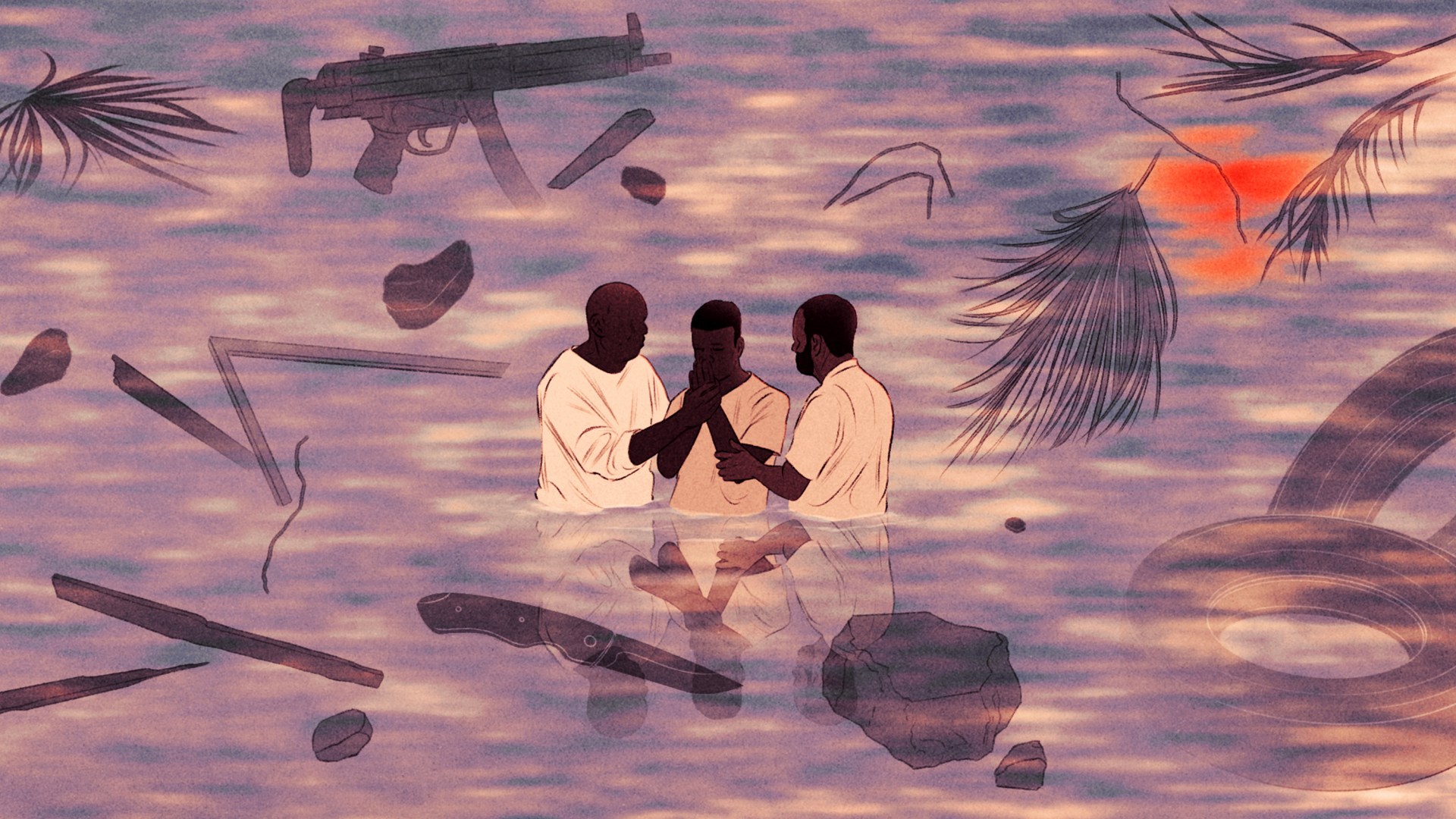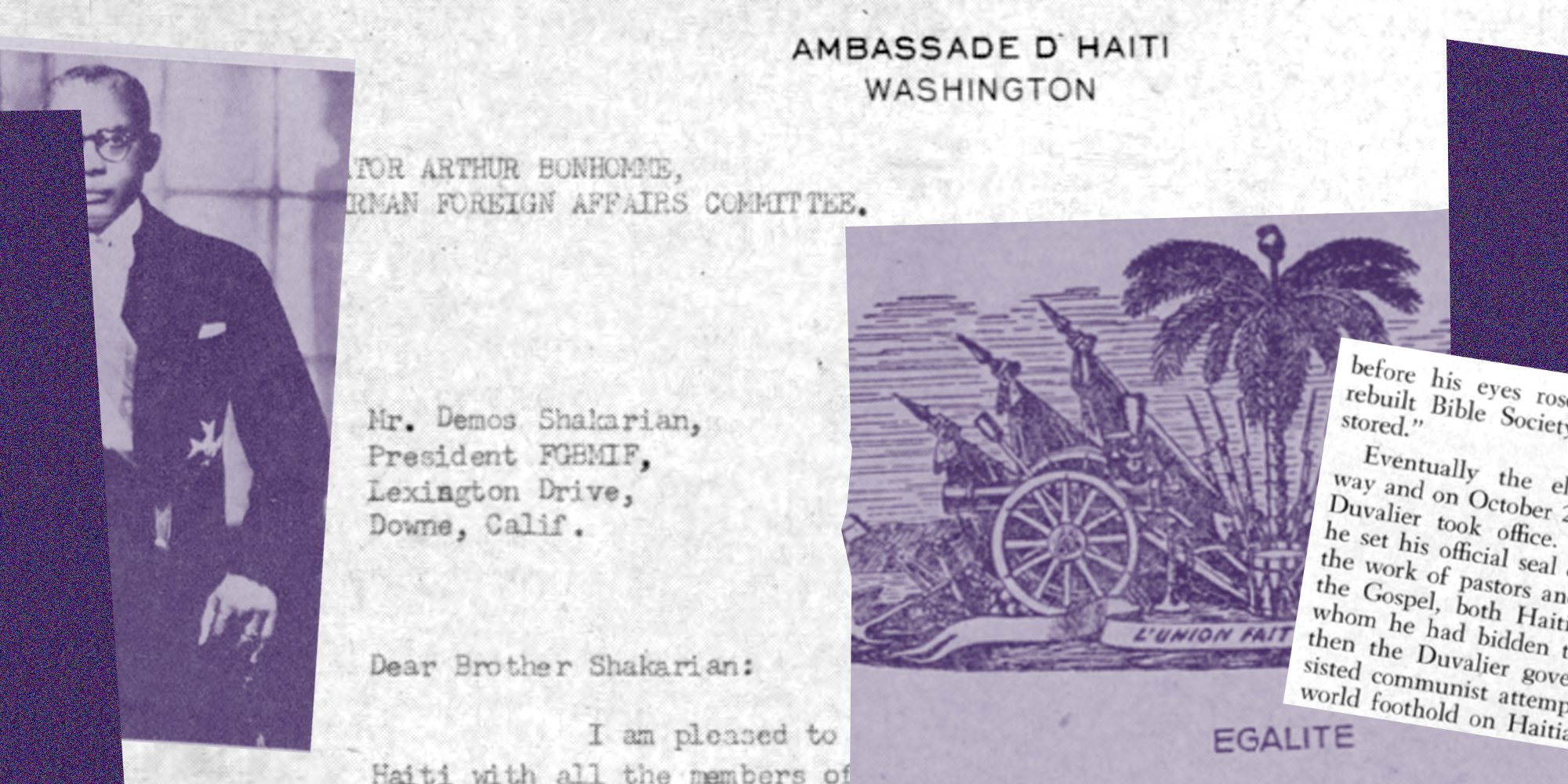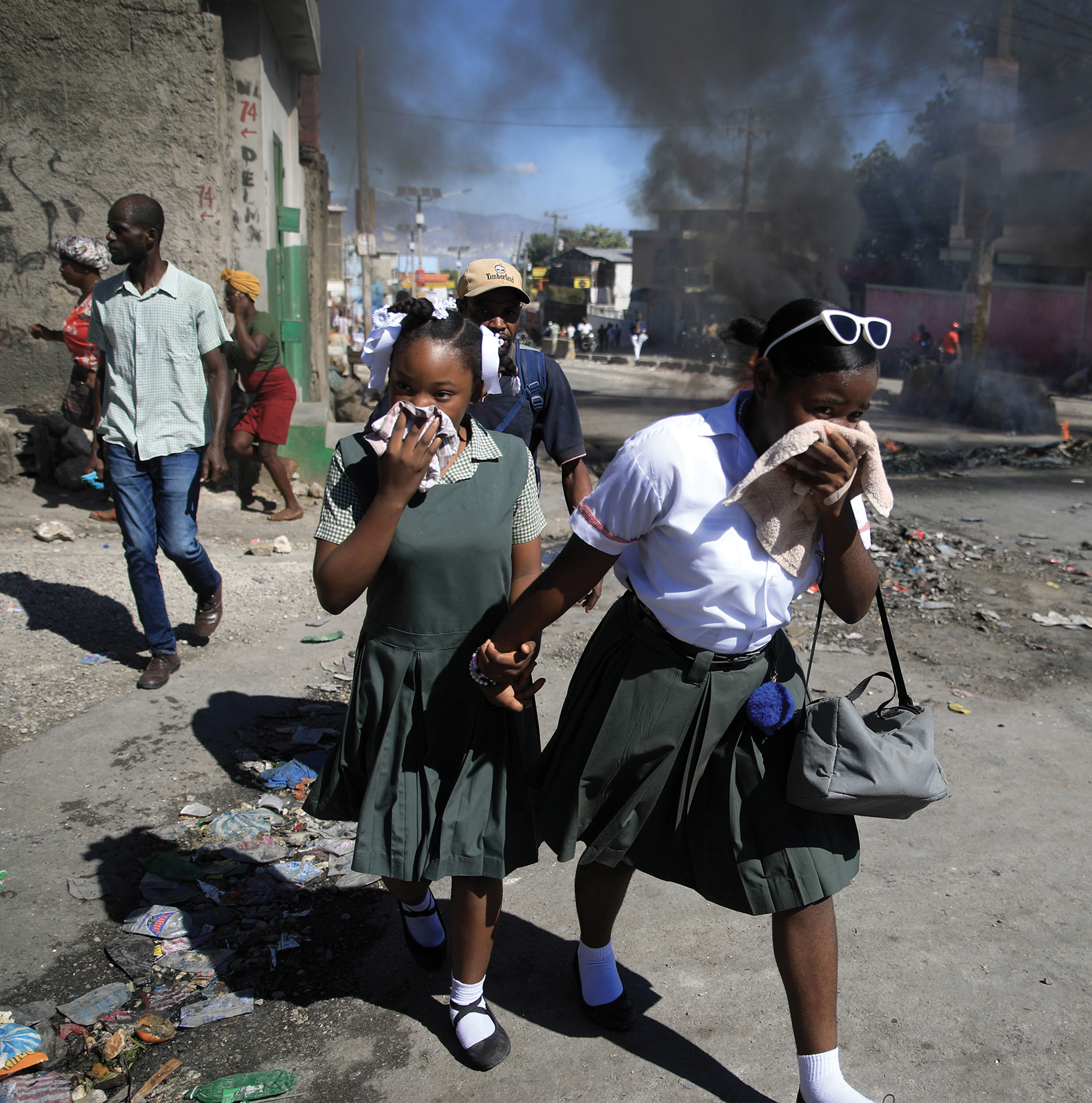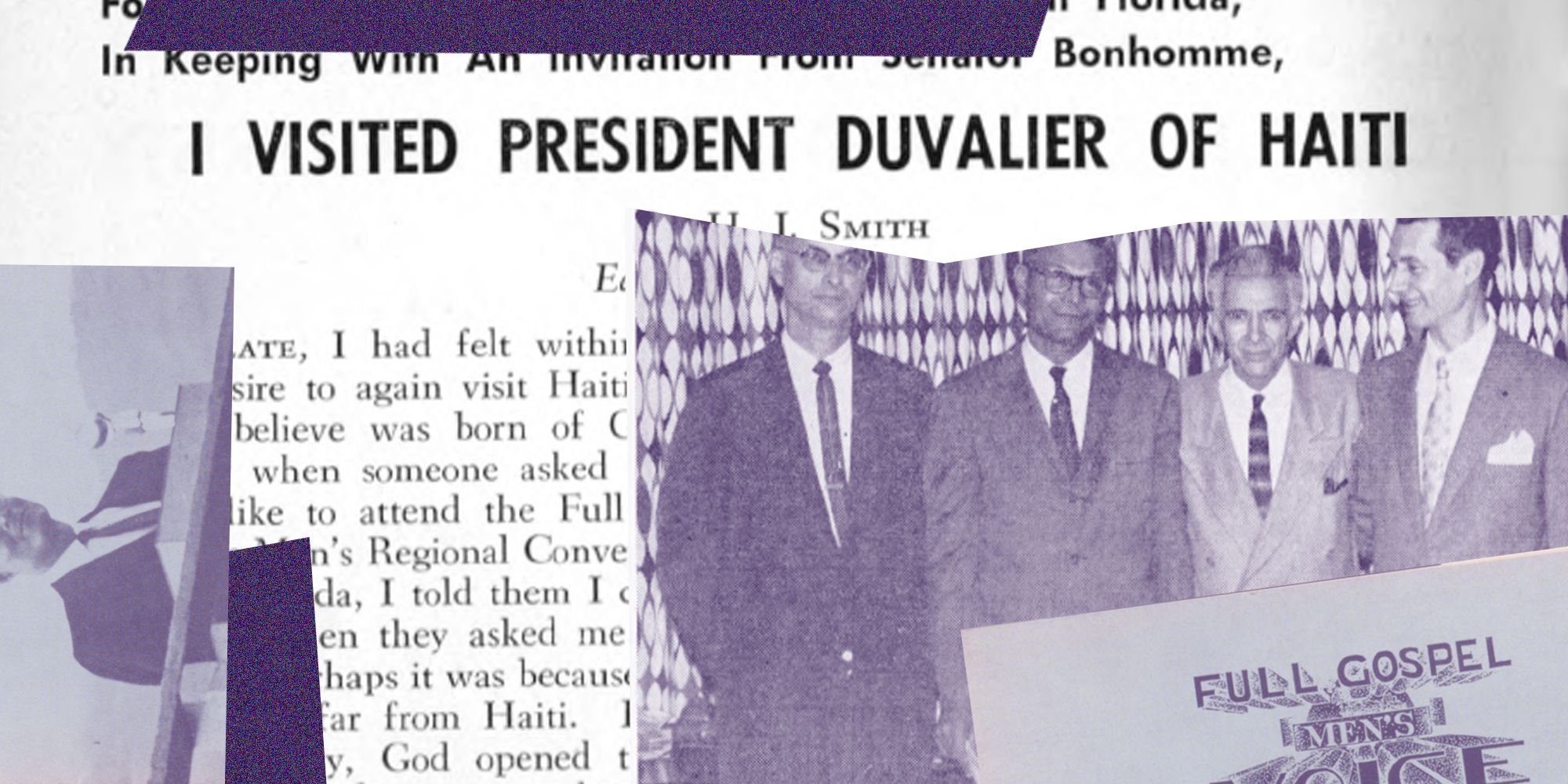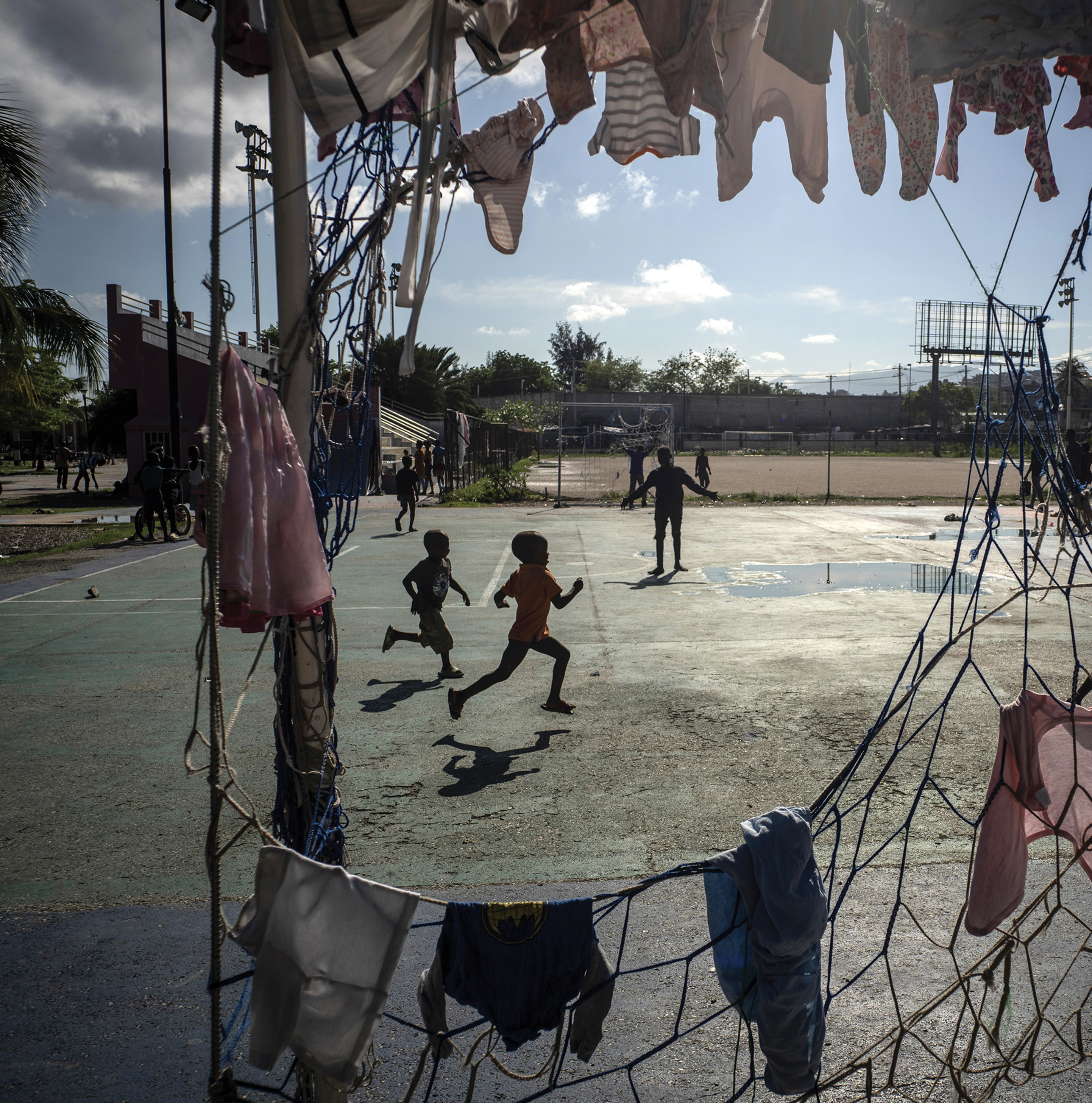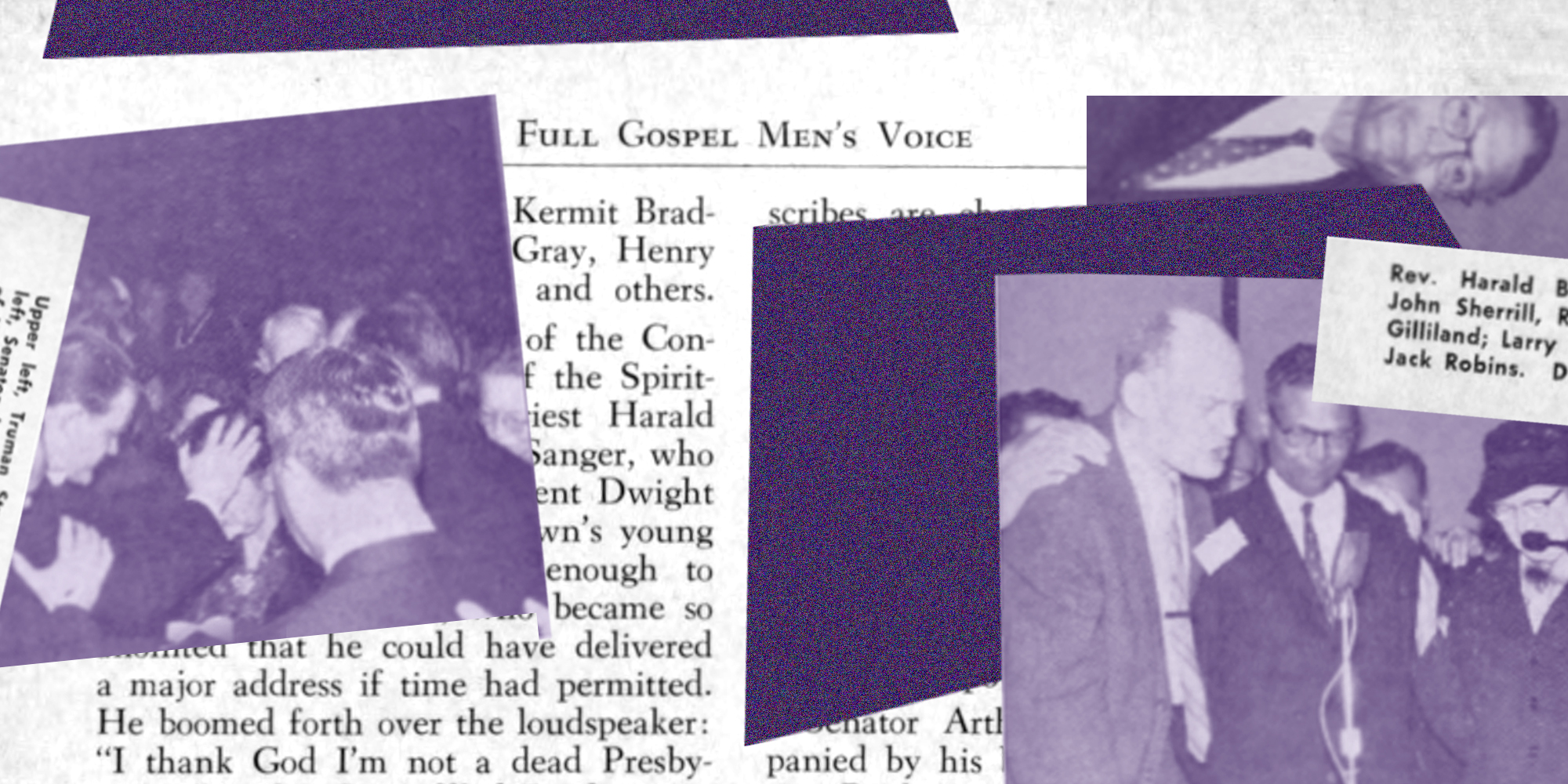Right now, the Western Hemisphere’s second-oldest republic is collapsing. Militant gangs in Haiti control most of the capital, Port-au-Prince, and significant territory in other cities. They extract bribes at gunpoint for every case of diapers, bag of rice, box of gauze, and gallon of gasoline that moves in or out of its seaport. They set fire to neighborhoods and mount coordinated attacks on police stations. They drag rivals from emergency room beds and execute them outside.
Thus, Haiti’s economy is in free fall. Its annualized inflation verges on 50 percent. Fuel in some areas fetches $10 a gallon on the black market. The nation is slipping into famine—a term, believe it or not, rarely before used there. Thousands of its people are swamping boats bound for South Florida and marching across continents and piling up against the US-Mexico border.
To face these crises, there is no government. Haiti’s putative head of state, prime minister and acting president Ariel Henry, took office after the brazen and bizarre 2021 assassination of an unpopular president. But Henry is also unpopular. He has long overstayed the constitutional limits of his term. To replace him, Haiti would need to hold elections; its last elections were so long ago that every chair in its legislature sits empty.
Haiti cannot safely hold elections, though, because law enforcement is consumed with a battle against gangs that have become so powerful that young men who want to join them are reportedly put on waitlists. The national police—a force roughly the size of Chicago’s police department tasked with securing a mountainous land of over 11.3 million people—are underpaid, underequipped, and burning tires in the streets in exasperation. Yes, corruption infects their ranks. But also, at least 78 officers have been killed in the line of duty in the last 19 months.
Last October, Henry asked the international community for “the immediate deployment of a specialized armed force, in sufficient quantity” to help contain the gangs. Four months later, that hasn’t happened.
Today’s instability has shaken Haitians in some ways even more deeply than the horrors of Haiti’s 2010 and 2021 earthquakes: It is corroding the communal bonds that have carried them through generations of hardship.
“I have never seen people in the street so fearful and suspicious of other people,” Guenson Charlot, the president of Emmaus University, a Wesleyan college and seminary near Cap-Haïtien, told me. “That is damaging the very fabric of our resilience.”
How did it come to this? When I worked in Haiti in the early 2000s, first as a journalist and then with an aid organization, I often heard both Haitians and blans—as foreigners are known there—attribute the nation’s afflictions to vague causes. Corruption. Deforestation. Vodou.
There are more specific explanations. There is the collective trauma imparted by life under butcherly French slave owners and by a war for independence that ended in tit-for-tat genocide on both sides. There was the time, two decades after Haitians won their freedom, when France sailed 14 gunships to Port-au-Prince and demanded 150 million francs to recognize Haiti as a nation—a sum that economists estimate ultimately left the country with a $21 billion handicap. And let’s not forget 1914 and 1915, when US Marines plundered Haiti’s national bank of gold and, months later, returned and seized control of import and export tariffs, the government’s main source of revenue.
If the complexity feels numbing, well, it is. The antecedents of Haiti’s meltdown stretch like a thread across five centuries. Pick it up wherever you like, but you won’t make out the whole length.
Evangelicals, however, have an easier starting point for understanding Haiti’s story. We wrote ourselves into it.
Haiti has been one of the world’s most active mission fields for American evangelicals—so active that, in 1983, the pope visited the country and made it a rallying point against the concerning inroads Protestants were making into Catholic turf.
As of 2020, according to the Center for the Study of Global Christianity, roughly 1,700 career missionaries were serving in Haiti—one for every 7,000 people. No one counted how many Christians went there on short-term trips before the COVID-19 pandemic curtailed such travel. Some have put the number at around 10,000 a year, a figure that seems low. In a three-month study from 2013, more than 9 percent of travelers entering Haiti with a tourist visa said they were there for missionary work, meaning a more reasonable guess may be that, at one point, something like 85,000 short-termers were traveling there annually, the large majority of them from North America. Picture the entire population of Franklin, Tennessee, flying to Haiti over spring and summer break, then doing it again next year.
If you have ever traveled there, or if your brother or daughter or friend is a member of that vast group, then you know at least one gift Haiti gave the church: a playground for spiritual retreat. We built a vast network of facilities across the country offering camp-like experiences whose benefits, mission leaders have not been shy to admit, mostly accrue to visitors. Whatever your opinion on short-term missions, a tour in Haiti—or repeated tours—has now shaped the faith of generations of Americans.
“Every church and mission group has a presence in Haiti,” Wendy Norvelle, then a spokeswoman for the International Mission Board, told NBC after the 2010 earthquake.
Relatively speaking, almost no missionaries are traveling to Haiti at present. The risk of kidnapping is too high. But missionary work has taken: Almost all Haitians claim the Christian faith, and somewhere between a quarter and half of Haitians today are Protestant.
So why is Haiti not stronger for it? Haiti’s current crisis is, first and foremost, a tragedy for Haitians. Simple compassion demands we not look away. But it is also a reckoning. How did the most evangelized realm in all the world become a nation in dismaying anarchy?
Any significant encounter with Haiti puts you at risk of infatuation. I succumbed nearly two decades ago, scribbling in the margins of books ranging from C. L. R. James’s history, The Black Jacobins, to analyses by journalists and sociologists, to the moving writings of Edwidge Danticat and the unsettling fiction of Marie Vieux-Chauvet. But for a nation that hosts so many missions and aid organizations it has been dubbed the “Republic of NGOs,” no decent accounting exists of the role evangelicals played in Haiti’s formation.
As it turns out, there were roughly two eras of evangelical missions there. In the first, a small band of missionaries saw their calling as spreading the gospel and helping build and defend a Haitian state that would bless its people. In the second era, a legion of missionaries advanced the gospel by building a parallel state of their own. They relieved Haitians from the harms of a brutal dictatorship. But in the process, missionaries also became the regime’s unwitting instrument, providing it cover as it ransacked the Haitian state. They may even have helped prolong the regime’s cruelty.
All of this primed Haiti for the implosion happening before our eyes. The blame, of course, does not lie solely at missionaries’ feet. It is shared by entire nations, by international organizations, and by individuals. But for now, to the plank in our own eye: If there is a next era of missions in Haiti, it will be judged by what we do in this moment—and by whether we can recover the spirit in which Haitians first called us there.
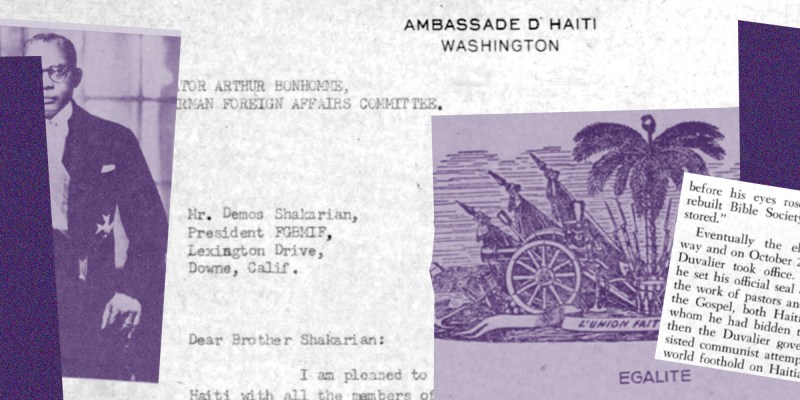 Illustration by Mallory Rentsch / Source Images: Full Gospel Business Men’s Fellowship International
Illustration by Mallory Rentsch / Source Images: Full Gospel Business Men’s Fellowship InternationalI. The first era
I began to understand the first era of evangelical missions in Haiti when, exploring the dusty annals of British sending agencies, I stumbled upon a man I had never heard of named Mark Baker Bird. You should know a little background before we get to the day his house fell, in 1842.
Bird, a 30-something Methodist from England, led a small mission in Haiti. Other English Methodists had started the mission decades before him—some came at the written invitation of Haiti’s first president, Alexandre Pétion, and some came clutching a letter of endorsement from Britain’s star abolitionist, William Wilberforce.
Even with friends in such high places, Methodism had grown to little more than a couple of house churches by the time Bird arrived. He was one of the country’s few white missionaries. Protestant workers were fanning out across the world in the middle of the 19th century, but they largely bypassed Haiti. Most of the few missionary efforts gaining traction in the young nation were initiated by Black believers escaping antebellum America or inspired by the prospect of a Black-led republic.
The Bird family—Mark, his wife, Susan, and their three young boys—lived in Cap-Haïtien, a city on the north coast with august colonial architecture and a glittering harbor, hailed as the “Paris of the Antilles.” On the sweltering afternoon of May 7, Mark was on his balcony, catching what breeze he could, and was feeling optimistic. After two years in country his French had improved and his friendships multiplied. Tomorrow would be Sunday. He had just written his supporters that he was “ready to hope for good days here at the Cape.”
But the Birds never made it to church that weekend. At 5 p.m., a magnitude 8.1 earthquake struck, its epicenter directly beneath the city’s harbor. Floors gave way. Grown men hugged one another as they dropped. More than 5,000 people were swallowed by crumpling masonry and flames kindled therein.
Bird found himself face-down in the street. His wife and children were inside their toppled residence, hunkered in the lee of a wall that had not fallen. Astonishingly, the entire family survived. They relocated from the ruined city to Port-au-Prince. Then, within weeks, their two youngest sons died.
If the Birds had quit, you wouldn’t have blamed them. It might have been the embrace of the Haitian-led church in Port-au-Prince that kept them there.
Port-au-Prince was the hub of Methodist action. The 100-member-strong congregation there was just completing a stone-and-brick chapel, only the second Protestant church building in Port-au-Prince. And in 1843, they started a school. To be more precise, the government started a school. The president was pushing for better education, and the city of Port-au-Prince needed to launch half a dozen free primary schools. It asked Bird to run one of them in the Methodists’ new chapel.
The government funded the school at the 19th-century equivalent of a couple thousand dollars a month, and the mission provided some teachers and the rest of the budget. Soon, 180 students had enrolled.
Haiti in 1844 was young and scrappy, still infused with the memory of thumping Napoleon’s army and with a vision of what the young nation could become. That year, the government partnered with the Methodists to open schools in several other cities. A government leaflet called on churches to help rebuild the country—it was still recovering from the earthquake—and remarkably, the leaflet challenged missionaries and pastors to preach against the Black-versus-Mulatto racism that was fueling political violence and tearing Haiti apart.
“The influence of religion on public education, and on the happiness of a people, is now no longer a matter of dispute,” is how Bird translated part of the document in The Black Man, one of many books he wrote later in life. “Let the sacred Word recall from their errors any who, through ignorance, depravity, or any other cause, have been led to attach any importance to the color of the skin.”
When the Port-au-Prince school outgrew the church’s sanctuary, Bird went knocking on doors to fund a dedicated building. More than 160 Haitians and foreign-born business leaders committed to make monthly donations. The president gave money. Nearly the entire cost—somewhere over $100,000 in modern terms—was raised locally. Bird christened the new schoolhouse in July 1846, to the soundtrack of flutes and violins and a hymn written specifically for the occasion.
The government and the Methodists continued to join forces well into the 20th century. According to Bird’s personal letters, newspaper accounts, and the published histories of the English Wesleyan mission, officials gave grants for the construction and repairs of Methodist churches and school buildings. They funded evangelism efforts. In 1881, mission records show that the government was contributing 42 percent of the Methodist church’s budget.
These numbers seem almost unfathomable to me today. You could fill a library with books and articles critiquing Haiti’s toxic dependency on foreign aid. It strained my imagination to picture a time when Haitians weren’t dependent on the missionaries and, instead, the mission was dependent on Haitians.
It was not entirely unusual for English missionaries in the British Empire to get financial help from colonial governors, just as Catholic missionaries got a boost in Catholic colonies. But this dynamic was strikingly different: White Methodist missionaries worked side by side with the independent government of formerly enslaved peoples. This partnership endured over a period in which, 600 miles north in America, the Civil War came and went and Jim Crow entered adolescence. The Haitian state saw the missionaries as allies in nation building and entrusted precious resources to their oversight. The missionaries saw the gospel as a gift for both individuals and entire societies, and they entrusted the Haitian state with the future of their programs.
They, like missionaries in Haiti ever since, did not have it easy. But Methodism “was always a player in the game,” Leslie Griffiths, a Methodist minister and member of Britain’s House of Lords who wrote a book about 19th-century Wesleyans in Haiti, told me. “It produced political, institutional, and even literary figures of great national importance.”
We’ll highlight just one: Louis-Joseph Janvier, a student at the Wesleyan primary school in the 1860s whose uncle had been arrested at a worship service during a period of anti-Protestant foment. Janvier went on to study in France, becoming a diplomat and one of Haiti’s most influential—if polemic—thinkers. There are schools named after him. In his writings, Janvier argued that to become a great nation, Haiti needed the Protestant church. The Protestant “is a friend of intellectual culture, a protector of science,” Janvier wrote in his 1885 book, Les Affaires d’Haiti. “He puts the light on the mountain.”
Not every Protestant missionary who set foot in Haiti in the 1800s was a light on the mountain. But as we’ve seen, the handful who went there at all during the 19th century tended to be drawn by a special interest in seeing Haiti succeed.
Griffiths, the Methodist historian, is shamelessly proud of what his church has done in Haiti. In his research, he boils down what I might even call the spirit of the first era, quoting the closing line from a posthumous book of Bird’s called Un Paradis Terrestre: “We leave to each Haitian, to each man, to each woman in this beautiful country, the country of our adoption, to wonder, in front of their incomparable resources, if Haiti could not be an earthly paradise.”
If the first era began with missionaries helping to forge the Haitian state, it ended with them fighting to save it.
On July 28, 1915, the USS Washington sailed into the waters outside Port-au-Prince, and 330 Marines disembarked in the city. Meeting almost no resistance, they seized control of Haiti’s government buildings and state institutions. Then the US Marines stayed for nearly two decades.
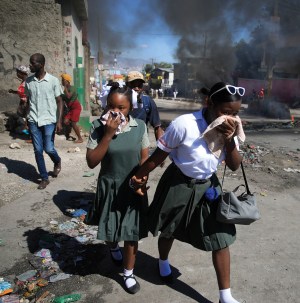 Joseph Odelyn / AP Images
Joseph Odelyn / AP ImagesA cocktail of worries triggered the US occupation: World War I had just begun. Germany was growing its influence over Haiti’s economy, stoking concerns that Berlin might secure a military base in the country. And Haiti was fragile: Seven presidential administrations had toppled in four years, each through revolution or assassination. One of them involved a bombing at the presidential palace that detonated thousands of kegs of stored gunpowder and shattered windows and doors at the Methodist mission a few blocks away.
Haiti has passed through much political fire. “But one could argue that 1911 to 1915 was probably the worst,” Chris Davis, a historian at University of North Carolina Greensboro who studies military interventions, told me.
Two missionaries, in particular, watched closely as the invasion unfolded. One was S. E. Churchstone Lord, a minister with the African Methodist Episcopal Church. The other was L. Ton Evans, a white Baptist pastor funded by the Lott Carey Society, a Black missions agency.
At first, both men were hopeful in their own way about the arrival of American troops. Lord saw them as a necessary evil to help a Black nation get back on its feet. Evans imagined the Marines as something like conquering heroes.
But things fell apart. The United States set up a puppet government and dissolved Haiti’s legislature when representatives refused to vote as directed. Business interests swept in, taking advantage of the situation to manipulate Haiti’s economy and steal its government revenues for US banks.
The Americans’ biggest misstep—one that galvanized Haitian resistance to the occupation—was born from gross ignorance or disregard of Haiti’s history, or from unvarnished racism, or from all of the above. Beginning in 1918, Marines and their local military counterparts forced thousands of Haitians from their homes, marching them to worksites to build roads and other infrastructure for meager pay. Haiti’s leaders had attempted such slavery-by-another-name schemes before—known as corvée—and they were universally hated.
This was the last straw for Lord, who was Black and who had quickly soured on the occupiers. He sent dispatches to his acquaintance, W. E. B. Du Bois, who used the reports as part of the NAACP’s campaign advocating for America’s withdrawal from Haiti. Lord shared eyewitness accounts with Black newspapers and magazines in the United States, describing incidents such as an assault by US troops that killed nine young Haitian girls. Lord published a piece in the Chicago Defender on June 4, 1921, in which he told readers that “if you condone the presence of the American Marines in Haiti you will be guilty of a more devilish lynch law than is known in America.”
Evans, the Baptist missionary, held out hope that the occupation was a force for good. But he was sending complaints of his own directly to the State Department. In letters, he criticized America’s steamrolling of the Haitian government and a tendency of occupation forces to jail Haitian judges and other officials it did not like. He was alarmed at the “brutality leading to frequent murders by ignorant, immoral and drunken” soldiers and at the ways that men were being seized on the road or in their gardens and forced to construct new roads, “and without food.”
In 1918, Evans’s missions agency urged him to give up his criticism of the occupation and focus on ministry. Someone in the Wilson administration had contacted a board member and hinted that Evans’s reports were un-American. Congress had only a year earlier passed sweeping legislation criminalizing anti-war speech, and the accusation was especially unsettling at the time for a Black organization.
Evans tried to get back to preaching. He traveled to the town of Saint-Marc, north of Port-au-Prince, to evangelize troops and prisoners. But as congressional records show, a Marine captain named Fitzgerald Brown confronted the missionary and threw him in jail for trying to “Christianize and mentally and morally develop these low” Haitians. While incarcerated for less than a month, Evans said that he witnessed, under Capt. Brown’s watch, prisoners being fatally beaten and their bodies put on public display.
After a Haitian court ordered that Evans be released, he was soon arrested in another Haitian city at the order of Marines allegedly conspiring with Capt. Brown. A different Haitian judge found no basis for the arrest and dismissed the charges. But before Evans left, a Marine officer allegedly threatened him with a gun and warned him against any more preaching.
The experiences were a watershed for American views of the occupation. In 1920, newspapers from New York City to Washington, DC, to Phoenix were running stories about Marine abuses in Haiti, and Evans, with his tales of being arrested twice for the sake of the gospel, was a frequent source. In 1921, he testified before Senate hearings. It would take the United States an agonizing 13 more years to completely extricate its Marines from Haiti, but the course was already set: American disenchantment with the project was snowballing, and internal government reports were exploring the best options for withdrawal.
On June 10, 1922, the Chicago Defender published an article featuring both Lord and Evans. It cast them as prophets standing against American attempts to “revive slavery” in Haiti—complete with an anecdote about Lord stepping in front of a group of Marines to stop them from firing on Haitians.
Davis, who introduced me to Lord and Evans, has been reflecting a lot on the history of missionaries in Haiti as he watches the political crisis unfurling now. He began studying the 1915 invasion after he went to Haiti himself on a short-term mission trip, then kept bumping into historians who had never even heard of the occupation.
“Part of what made missionaries so helpful in the early 20th century is that, yes, they were there as missionaries first and foremost, but they were also, whether they realized it or not, cultural representatives … to the American government, which was making decisions about a people that it had limited to no interaction with,” Davis said. “I haven’t seen that kind of interaction today, which is kind of a shame.”
II. After the colonizers
The second era of evangelical missions in Haiti did not begin until after the occupation. This realization took me by surprise: Missionaries are usually lumped in with the colonizers, and in some places like 1910s Nicaragua, missionaries drafted behind occupying US forces. I expected more of the same as I combed the archives of periodicals and the works of amateur historians. But in Haiti, the colonizers came and went, while the missionaries mostly stayed away.
In the late 1920s, a trickle of arriving missions organizations began widening into a stream. By the 1950s, buoyed by America’s global prestige after World War II and by a newfound interest in evangelizing the Western Hemisphere, the stream became a tidal wave.
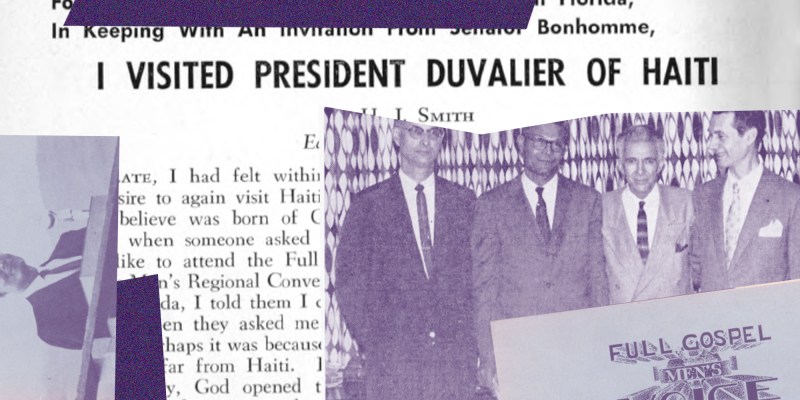 Illustration by Mallory Rentsch / Source Images: Full Gospel Business Men’s Fellowship International
Illustration by Mallory Rentsch / Source Images: Full Gospel Business Men’s Fellowship InternationalThe deluge coincided with the rise of François Duvalier, a soft-spoken and bespectacled doctor educated at the University of Michigan and known as “Papa Doc.” He was elected Haiti’s president in 1957 and became one of the Western Hemisphere’s most ruthless autocrats. He built a fearsome paramilitary group to punish dissent. He siphoned government funds and foreign aid to enrich himself and his supporters.
Duvalier eased into his villainy. During his first few years in office, he threatened political opponents into exile and shuttered unfriendly newspapers, and his agents began quietly abducting and torturing perceived critics.
One of Duvalier’s early targets was the Roman Catholic Church. A Catholic himself, he saw the church’s foreign-controlled hierarchy as a threat. In 1959 he began expelling Catholic priests for supposed acts of sedition. In 1960, after the regime arrested dozens of priests and nuns, Rome excommunicated Duvalier.
In stark contrast, Duvalier aggressively courted Protestants. In 1958, the president honored Wallace Turnbull, a conservative Baptist missionary and a statesman of American evangelicals in Haiti, for “tireless efforts and spectacular accomplishments for the welfare of the peasants of Haiti.” His regime reached out to a broad swath of US church groups. But nowhere was that outreach as well documented as it was in the charismatic movement.
In November 1959, Duvalier dispatched a member of his foreign affairs committee to a convention of Christian businessmen at a waterfront hotel in downtown Miami. Arthur Bonhomme was a Haitian senator and Methodist lay preacher and an architect of Duvalier’s evangelical strategy. Only three months after Haitian police had arrested several Catholics at a silent prayer meeting for protesting the expulsion of some priests, Bonhomme stood at a podium and read a message from the president: “I give the assurance of my desire to see Haiti evangelized and of the full protection of our constitution and of our laws for each mission that comes.”
After the conference, a Los Angeles minister named H. J. Smith flew with Bonhomme to Port-au-Prince and met with Duvalier at the presidential palace. “His one concern is for the advancement of his people,” Smith wrote about his visit in Full Gospel Business Men’s Voice, a magazine that recorded many of Bonhomme’s recruiting efforts among business leaders in the charismatic movement. The president repeated to Smith that he wanted American missionaries and evangelists to come to Haiti. Duvalier “has concluded that only those nations whose God is the Lord can hope to survive,” Smith observed. “May this coming year be the best that Haiti has ever experienced.”
But that year, 1960, was not the best. In the spring, the United States paused assistance to Haiti over concerns about Duvalier’s authoritarianism. Duvalier grew anxious and brooding. He hosted more evangelicals at the palace, urging them to tell their government to keep sending aid. Bonhomme sent a letter to Demos Shakarian, the president of the Full Gospel Business Men’s Fellowship, reminding him, “Do not forget the call from Haiti.”
Five months after Bonhomme typed that letter, Duvalier hosted a parade at the National Palace where he unveiled a new militia built of recruits from across the country, some of whom had already been murdering, torturing, and disappearing alleged opponents of the regime. Known best by its nickname, the Tonton Macoute, the force became the president’s main tool of terror to defend himself from opponents real and imagined.
Still, among evangelicals, Bonhomme kept up the charm offensive. His testimony—in which he suggested Duvalier, his boyhood friend, had been miraculously delivered from bombs and a heart attack in order to open Haiti to the gospel—was featured in various Christian publications. Bonhomme infused his message with Cold War rhetoric. In the summer of 1960, he spoke at a convention in Tulsa, Oklahoma, where an Assemblies of God pastor told the Full Gospel magazine he was thrilled to hear that a shipment of food to Haiti and an accompanying evangelism crusade “had stopped Communism dead in its tracks.”
By 1963, president John F. Kennedy, concerned about the actions of the Macoute and by reports that Duvalier was skimming as much as $15 million a year from American aid money, had completely cut off funding to the government. Instead, his administration began routing assistance to Haiti through nonprofit groups—including Christian relief agencies and missions. The booming humanitarian community kept resources flowing to desperate Haitians and also offered Duvalier cover. He doubled down on his oppression while outsiders tended to the needs of his people.
The wooing of evangelicals continued. Bonhomme engaged with evangelicals throughout the decade, a period during which the Duvalier regime assassinated or executed an estimated 30,000 or more victims around the country. Sometimes Duvalier supervised torture sessions or watched them through peepholes cut in walls at the Port-au-Prince police headquarters, where at least 2,000 people were killed.
Christians weren’t ignorant of the dictator’s crimes. Although the full extent of Duvalier’s bloodlust did not emerge right away, his brutality was regularly covered by US media, such as a mass execution of hundreds of dissidents in 1964. Yet as late as 1967, Bonhomme—by then promoted to ambassador—was speaking alongside Oral Roberts at a Full Gospel Business Men’s gathering in Washington, DC, attended by more than 1,000 people. In 1968, Bonhomme told CT: “Duvalier is a tool of God. If he was so wrong, he would be an enemy of the Word of God.” In 1969, Duvalier hosted Roberts and a student choir from Oral Roberts University at the presidential palace.
The regime’s terms for missionaries were unambiguous. After ejecting more than 18 Jesuits from the country in 1964 for complaining about the government’s interference at a seminary, the foreign ministry said in a statement that it welcomed clergy “so long as they do not interfere in the internal politics of Haiti.”
Missionaries weren’t spared all the pain of political unrest. Many evacuated when anti-Duvalier protests flared in the early 1960s and again during violent spells in later decades. Some had run-ins with the regime when they were wrongly suspected of trying to undermine it.
Even so, by the early 1970s, missionaries and aid groups were pouring into Haiti at a breathtaking pace. As many as four or five US denominations per year were establishing missions in Haiti, a country with a landmass the size of Maryland. They opened hundreds of schools and clinics and orphanages and radio stations and feeding programs. Charles-Poisset Romain, a Haitian sociologist and theologian who wrote one of the country’s most important histories of Protestantism, argued that Haiti during the ’70s was the most active mission field in the Western Hemisphere.
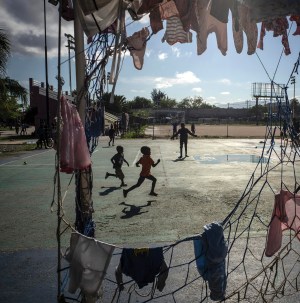 Ramone Spinosa / AP Images
Ramone Spinosa / AP ImagesDuvalier’s heart gave out in 1971, and he passed his illicit kingdom to his reluctant 19-year-old son, Jean-Claude “Baby Doc” Duvalier. Jean-Claude swore to the world he’d do better than his father but followed more or less in his footsteps—minus some of the brutality but with extra helpings of self-enrichment in the form of European shopping sprees and a $2 million wedding.
Jean-Claude, who dozed during cabinet meetings and neglected statecraft and fancied France, didn’t continue his father’s overtures to American evangelicals. But he didn’t need to. He persuaded the United States to resume aid to his regime, and Protestants already had momentum. They ran at least 35 percent of schools in Haiti. In 1983, the Haitian Council of Evangelical Churches listed 1,097 Protestant organizations—almost certainly only a partial accounting. Twenty percent of them reported being involved in evangelism or church planting; the rest were dedicated to aid projects.
In one of Jean-Claude’s final acts before being overthrown and fleeing the country in 1986, he recognized Protestantism as an official Haitian religion.
The event could have been a ribbon-cutting for the crowning achievement of the second era: the short-term surge. What North American churches had built in Haiti provided a trestleworks for the short-term missions machine that roared in during the late 1980s. Haiti was uniquely-suited for quick visits: A two-hour flight from Miami, it offered church groups “a little piece of Africa,” as I sometimes heard it described, in a place that for millions of Americans was easier to get to than Mexico. The service trip became, if not the defining facet of American Christianity’s relationship with the nation, at least a monument to how geography had bound them together. (“The biggest threat to our ministry,” one mission leader told me, “is not being able to get mission teams in.”)
If the missionary enterprise flourished under the Duvalier family’s reign, Haiti was left behind. Its economy stalled for 28 years. Preoccupied with eliminating threats to power, the Duvalier government made little investment in services like education, infrastructure, or health care. Haiti’s police and justice system, having been hijacked for the regime’s ends, offered no real protection to the most vulnerable. Educated professionals—the managerial and the creative classes that Haiti desperately needed to right itself—fled by the thousands. The regime cemented an oligarchy that, Haiti observers say, is roughly the same one that funded the gangs warring for control of Haiti today.
The Haitian state never really recovered. In three and a half decades since the end of the Duvalier era, there has been no merger of Haiti’s two republics—its constitutional one and the Republic of NGOs. True, subsequent natural disasters and waves of unrest—the saga of twice-elected and twice-overthrown President Jean-Bertrand Aristide, for instance—buffeted Haiti’s civil servants and the machinery of its democracy. But the state wasn’t broken by an earthquake. It was broken before.
As the edifices of Haiti’s most important institutions burned and reburned, scores of American evangelicals acted sacrificially and even heroically: rescuing victims from the inferno and giving them cups of cold water and, yes, preaching the good news that their hope ultimately lay beyond any shelter those edifices could offer.
Could they have done more to fight the fire? We’ll never know.
Here’s what we do know: We know, as CT has covered, that missionaries in bygone times and places documented abuses and stirred up opposition in ways that made possible the birth of the nation of Botswana and reforms in the rubber industry. We know that, in Haiti, when missionaries spoke out against the violent oppression of Haitians during the US occupation, it shook public opinion and spurred government action. We know that, in the mid-1980s, the liberation-theology wing of the Catholic church rallied the masses and eventually led to Jean-Claude Duvalier’s ouster.
Haitian evangelicals were “very timid” about politics, Claude Noel, then head of Haiti’s Council of Evangelical Churches, told CT a few months after Jean-Claude stepped down. “Whenever the question came up about saying something against the political situation, the pastors would declare that their job is to preach the gospel, not to be political leaders. If the churches had stood together from the beginning, the Duvalier regime would not have been able to stand for long. And those in power would not have been so bold in their oppression.”
For the few who tried, resistance was dangerous—and messy. Leslie Griffiths, the Methodist historian, would know. In the 1970s, he was vice principal at Nouveau College Bird, the Port-au-Prince school Mark Bird founded—and where Jean-Claude Duvalier was a student. A couple of times Griffiths was summoned before François Duvalier to prove the school’s loyalty to the regime. His Haitian boss, Alain Rocourt, was forced by Macoutes to dig his own grave before they had a change of heart and spared him.
But what about Arthur Bonhomme, who was also a Methodist? “I can’t even begin to accept the suggestion,” Griffiths told me, “that Methodism might have cozied up to the dictator.”
Then there was Raymond Joseph, a Haitian pastor’s kid who grew up among Baptist missionaries. He was educated at Wheaton College and worked for a while as a Bible translator. In 1964, Joseph was studying at the University of Chicago and dreaming of starting a Christian college in Haiti when he learned that François Duvalier had invited children to witness a firing squad.
“I was revolted,” Joseph told CT in a 1968 interview. He had heard missionaries preach that Christians should avoid politics. He felt they were turning a blind eye to Duvalier—were sometimes using prayer as an escape from taking action—and he was tired of it. Haiti needs “more than the Bible,” he said. “What we need is to get rid of a dictator.” He moved to Brooklyn and became a journalist. He led a coalition of exiled Duvalier opponents and built a spy network in the presidential palace. After the 2010 earthquake, he launched a failed bid for Haiti’s presidency.
The criticism didn’t land well in missions circles. “Our old friend Raymond Joseph is proving himself out of fellowship with his Lord,” Wallace Turnbull wrote in an angry letter. “The hundreds of foreign missionaries and national ministers who have continued to preach the Gospel and to lend their neighbors a helping hand are not seeking escape from social problems. We are following the example of our Lord, who did not abolish crucifixion or gladiatorial combat but taught by example the way to show his love and salvation from sin.”
That may be true. If Haiti ever has elections again, however, Charlot, the seminary president, wants to see evangelicals show their love a little more at the ballot box.
“People in the church don’t vote,” he told me. “And we suffer from the consequences.”
There are reasons for that. “We have a big divide between the secular and the sacred,” he said. Many Christians think “if you want to have a good life after this life, you should not be involved so much in the secular things. And one of the most secular things in the mind of people in Haiti is politics.”
Is it possible that missionaries, with the best of intentions, left the church ill-equipped to help Haiti solve some of its most crippling national challenges?
“That is a solid argument,” Charlot said. He’s one of a number of church leaders who think the explosive evangelical growth came at the expense of depth. Missionaries often passed down a faith that was orthodox but not contextualized. Believers learned to avoid Vodou but not how to engage a culture seeped in it.
Today, he said, up-and-coming Haitian church leaders are starting to ask, If politics in Haiti are so bad, isn’t it because we aren’t part of it? “Some of the older pastors don’t take the position that we, the younger ones, are taking right now. What is going on outside the church world does not concern them. They must have learned that from somewhere.”
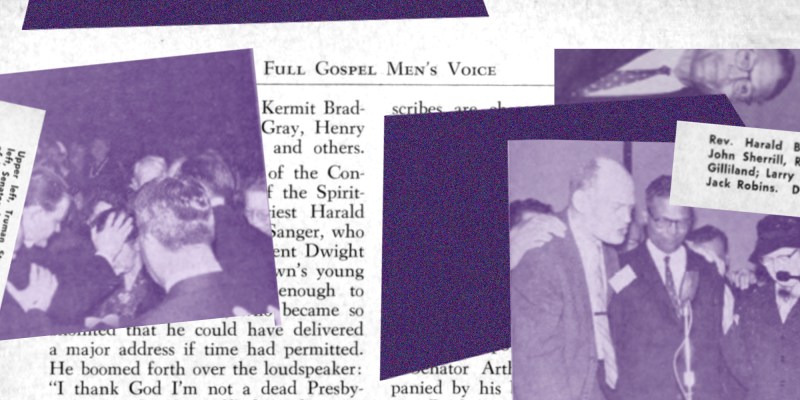 Illustration by Mallory Rentsch / Source Images: Full Gospel Business Men’s Fellowship International
Illustration by Mallory Rentsch / Source Images: Full Gospel Business Men’s Fellowship InternationalIII. The next era
So, what now? On a dark evening in January, I was listening to another Haitian diplomat address a convening of church leaders and make his case for their help. Bocchit Edmond, Haiti’s ambassador to the United States, spoke into a webcam to a mostly faceless Zoom crowd of church leaders, nonprofit directors, missionaries, and donors. It was a friendly audience. His pastor, who baptized him decades ago in a Port-au-Prince church, prayed for him on the call.
Edmond was not boasting about defeating communism, like his predecessor Bonhomme. He was not expounding the virtues of Protestantism in nation building, as his counterpart of old, Louis-Joseph Janvier, once did in his writings. Edmond just sounded desperate.
“Sometimes, I’m really scared that one day I will wake up in the morning to hear that the gangs have taken over all the public institutions—the president’s office, the prime minister’s office,” he said. “I’m really scared of that.”
It’s not hard to imagine. Effectively, Edmond is already an ambassador without a government. He wondered aloud if Haiti might already be a nation without an economy. And he wondered if anyone really cared. “To some extent,” he said, “the signal we have had is like signaling that Haitian lives are not important.”
Since Henry’s request for military assistance four months ago, there has been little movement. The United States and Canada slapped financial sanctions and visa bans on Haitian politicians and oligarchs thought to be supporting gangs. But many observers say the largest of the gangs are now powerful enough they have outgrown the need for their underwriters.
On the Zoom call, Edmond said his country needs boots on the ground, and it needs Christians to lobby for them. Haiti is not asking for a 1915-style US Marine invasion, Edmond said. It needs an international force with “more firepower” to equip, train, and fight alongside Haiti’s national police. “You have to talk to the leaders of the churches you are connected to,” Edmond pleaded. “Contact the offices of senators, representatives.”
Is he right? Clearly, an intervention is warranted. With each passing day it seems less likely that Haiti’s police will suppress the gangs on their own. It is obvious to Edmond and to anyone who follows Haiti that the international community is waiting for the United States to take the first step and lead a fighting force that could, at the least, reopen key roads and enable medical workers and food to begin moving again through Port-au-Prince.
The Biden administration has spent $92 million over the last year and a half to airlift armored vehicles and ballistic vests and trainers to the National Police. It’s a start. “Is it enough? No,” Todd Robinson, the State Department’s security liaison to Haiti told the Miami Herald this month.
For one thing, there soon may not be many Haitian police to equip. After the Biden administration announced in January that Haitians could enter the United States under a new immigration policy, Haitian officials had to open a dedicated office just to process the thousands of police officers applying to flee the country.
“I’m not sure the Haitian National Police force has the strength at this point that, just given the tools, they’ll be able to take it from there singlehandedly,” Davis, the military historian, told me. “The situation has gotten to where military intervention is a bad option, but it might be the least bad option.”
Last year, pundits and Haitian diaspora were warning against another American intervention in Haiti. Skepticism seemed prudent: US troops have been to Haiti three times since the fall of the Duvaliers. None of the operations were as reprehensible as the 1915 invasion, but all had mixed results. As recently as January, foreign policy wonks were penning their objections, urging US leaders to listen to what Haitians wanted. But the outcry has been muted lately. Haitians, indisputably, want the United States to act.
“Ninety-five percent of Haitians are for the foreign police to come in,” said Mevais Lovinsky. He’s an attorney who lives and attends church in Port-au-Prince on weekends, but on weekdays works and sleeps in a town more than an hour away, where he can practice law safely. “Absolutely no, the national police cannot stop what we have in Haiti today without the international security support.”
The data bear this out. In a January survey by a leading Port-au-Prince polling firm, more than two-thirds of Haitians said they wanted an international force to come. A smaller survey conducted by the Haiti Health Network, an organization of local and foreign medical providers, found that 80 percent of Haitian respondents supported a military intervention. Christians in North America don’t need to have been on a trip to Haiti to have reason to lobby their governments to step in. They could do so simply because millions of their brothers- and sisters-in-faith next door are begging them to.
It’s not like Haitians are naïve about the side effects of foreign meddling. Their bodies are still paying the price. In 2010, Vibrio cholerae, the bacteria that causes cholera, slipped into Haitian waterways through the wastewater system at a camp of UN peacekeepers who had carried the microbe from halfway around the world. Nearly 10,000 people died in the ensuing epidemic. And a months-old resurgence linked to the 2010 strain has already killed hundreds more.
“We have some very unfortunate souvenirs—some scars—as a result of occupations,” Charlot told me. “If the international community is taking so much time, my hope is that they’re thinking differently than before” and learning from past mistakes.
But if he had to vote on a military force?
“If there is a way they can just come to just do away with the gangs, I would vote for that.”
Assume, by some small miracle, the international community provides the support Haiti needs and the gangs are brought to heel and commerce resumes and kids return to school and life returns to some kind of normalcy.
Then comes the hard part. Because a nation with no elected leaders—with an exhausted and demoralized police force and a currency gone up in smoke—does not reboot overnight. A reopening of Haiti will usher in the next era of missions there, and it will begin with a wholesale reconstruction of the state: rebuilding a democracy, reintegrating gang members, restoring basic medical care and education that was inadequate to begin with.
If we do not want the country to return to chaos and bloodshed, missions and Christian aid groups must be a part of that process. They should participate not out of guilt, but out of generosity. Haitians helped evangelicals build a missions empire in their backyard; it will be our turn now to heed the words of the prophet Jeremiah to “seek the welfare of the city where I have sent you in exile, and pray to the Lord on its behalf, for in its welfare you will find your welfare” (29:7, ESV).
Missionaries and short-term groups and donors who come back to Haiti will have to find ways to invest in and advocate for Haitian institutions, not merely their own. They will have to rediscover the examples of Mark Bird, and S. E. Churchstone Lord, and L. Ton Evans and imagine new ways to imitate them.
The first and easiest step will be ensuring that missions groups are investing in the Haitian leaders already under their noses: promoting Haitian staff to the highest levels, if they haven’t already, and giving them the largest vote in organizational decision-making processes. Training Haitian medical students, if they aren’t already, then finding ways to employ them to treat patients who before might have only been treated by visiting medical teams.
The next step will be identifying leaders that the usual patterns of evangelical engagement in Haiti have overlooked. This will be less intuitive. For instance, instead of underwriting higher education only for charismatic Haitians savvy enough to endear themselves to visiting mission teams and future benefactors, could those teams underwrite a young scholars program administered through a Haitian youth group or high school?
But the rethinking of the missions enterprise will have to go even further. If we want a Haiti and a Haitian church that actually look different in 50 years than they do today, the next era of missions must involve projects and partnerships that churches have rarely attempted, like working with trustworthy Haitian churches to establish scholarship funds for the children of underpaid cops, or directly contributing to the budget of an under-resourced public clinic just down the road from a mission compound.
Finally, the new era may even require the church to take big and risky bets. So far we have spoken of Haitian law enforcement as something strictly for governments to repair. But justice system reform has been a hallmark of evangelical charity in the last two decades. Groups such as International Justice Mission—where, full disclosure, I was once employed—have convinced Christians to give hundreds of millions of dollars to high-level reform and anticorruption programs in some of the world’s most notorious judiciaries. Is there really anything, besides will, stopping evangelicals from exploring similar partnerships with Haitian police, judges, and prisons?
Ideas like these may work, or they may fail. No matter. Foreign evangelicals cannot end Haiti’s problems, but we can stop doing our own thing. Careful listening—to what Haitian churches want, to what Haitian community leaders want—will be one of the most powerful tools for building back a nation.
“You know what I’m praying for? I’m praying for God to put me in touch with people who are not just in the business of ‘fix it now,’” Charlot said. He’s thankful for those who give food and medicine and meet Haiti’s urgent needs. But he would be ecstatic to meet donors who did not care whether their money made any immediate difference. “We need people who are thinking about the next generation, 15 years from now—people who are okay that they may not see with their eyes what they see in the Spirit.”
It will not be easy. It will have risks. And it will be frustrating. But we know the alternative: In the absence of a functioning Haitian state, leaders of multiple ministries have told me their organization may not survive much longer. Already this year a major hospital has closed because there are virtually no police nearby to protect it. A clinic in southwestern Haiti now employs a small army of 72 security officers. The director of a surgery center closer to Port-au-Prince recounted to me how, in the past three months, one of his doctors was shot and another was kidnapped. (The doctor was released after a child-sponsorship ministry agreed to deliver a shipping container of food to a gang.)
The greatest obstacle to reprogramming missions in Haiti, however, may not be external. It may be reprogramming the evangelical mind: Christians, both American and Haitian, will have to believe in Haitians again.
“I don’t think a lot of people realize that there’s sort of this tendency to write off Haiti as naturally politically unstable and just assume this is their fate,” Chris Davis, the military historian, said. But “there are solutions we can work toward to solve that situation.”
There are signs of hope. When I talk to Haitians and ministry leaders and aid workers, I hear them asking hard questions about their methods and making real changes that few people were making when I worked in the country nearly 15 years ago.
“There’s been a lot of education in the missions world about how it’s better to work with indigenous populations than to just go in and start your own thing,” Barbara Campbell, who runs a foundation in Ohio and helped organize the Haiti Health Network, told me. “I see a lot less of that.”
She hopes all that progress is not about to be lost. Last week, Mission Aviation Fellowship announced in a letter to customers that it is pulling out of Haiti for at least the rest of the year for the safety of staff. It was the last remaining provider of flights to more than a dozen small and rural airfields around the country and, for many organizations, the only way to skirt gang-controlled roadways. “This is a game changer for a lot of missions barely hanging on,” one missionary told me.
Charlot doesn’t have all the answers. But he’s confident in the Haitian church’s potential to help its country. He points to the fact that the congregation he pastors has given nearly $60,000 from its own pockets to fund a building. He thinks gangs haven’t yet taken hold of his city, Cap-Haïtien, because many of its police officers are in his congregation and have found supernatural strength to stand against them. He believes that, somewhere in his church, there is a kid someone is going to help to go off to college and study political science, and that kid is someday going to be elected as his mayor.
If the Haitian church should have a political agenda, Charlot says he can’t yet see the details. But he is asking God how he should lead to help pull Haiti out of its nosedive. Last December, he joined more than 350 other pastors and their families from in and around Cap-Haïtien who gathered at a megachurch to pray for their country. Pentecostals, Wesleyans, Methodists, Baptists, Church of God pastors—they filled seats on the floor and spilled up two balconies as they pleaded with God.
“We were all crying, literally crying to the Lord, telling him, ‘Enough is enough. You have to come help us. We have exhausted every option; we have cried to our friends in other countries. Nothing is working,’” Charlot said. “He’s the only one who can do what we need for him to do for us now.”
Andy Olsen is senior editor at CT.

